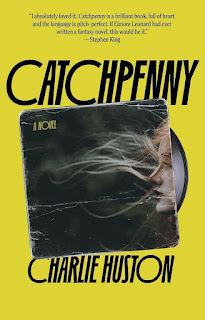Q: Do you have favorite craft sessions, or articles/books on craft that you return to for inspiration or help?
A: Craft questions often come down to how-to questions. I’ve spent much of my life thinking about creative processes in one way or another. There are many good books on the writing life, Julia Cameron’s The Artist’s Way, Anne Lamott’s Bird By Bird, John Steinbeck’s Journal of a Novel: The East of Eden Letters, are the first to come to mind. I have collected stacks of how-to books on writing, Zen meditation, sobriety, and conquering depression. Many I haven't finished, some I never opened. I guess I think the act of buying and stacking them will teach by osmosis. It doesn’t. I am a natural born contrarian. I seem to need to struggle and batter my way through and discover my own solutions to problems.
Reading is my best teacher. When I come upon a writer that really excites me, I read everything they’ve written to try and absorb their techniques. Reading Who Killed Palomino Molero?, I found Mario Vargas Llosa has a way of covering multiple conversations at once that is stunning and seamless. After reading several of his other books I’m no closer to discovering his secret, but damn glad to have found his work.
Against my will I’m getting older. I have many fewer words to write ahead of me than those I’ve left behind. Years ago sitting with my friend Charlie Huston he told me given what it took to write a book we had maybe x amount of books left in us. We needed to choose wisely what those books would be. I only half listened. The thing the Greek philosophers knew was that wisdom takes time to achieve. And once you achieve it your time is running short.
SIDE NOTE: It is universally unfair that we only achieve wisdom at the near end of our journey. It is equally unfair that great dogs don’t live as long their human companions do.
My real question now isn’t how to write a book, but why to write a book. The former is more universal, we all write differently within the limitations of twenty six letters and five to ten thousand unique word choices. We want a beginning, middle and end. Story elements and structures are objective. But the why of the matter, is subjective and purely personal. It can be as simple as, because I have a contract for this book and bills to pay. A very reasonable reason to write a book. But inside this lays a deeper reason. We all make known and unknown decisions about the books we write. I have called my books Trojan Horses where I hide ideas I want in the world inside. We all do this, it is impossible to write a book and not infuse it with your personal beliefs. Our books are conversations with readers, and they are conversations with ourselves. I continually have readers correctly point out themes in my work that I didn’t know I was chewing on.
I need to be clear here, I had a very personal motivation in writing Tricky. That isn’t always the case. Often I am hooked into an idea because I find something in it intriguing. This original idea is the vessel to hold the why that I will discover as I write. That seems a bit muddy. How do I come up with the why, really, at a how-to level. I spend a lot of my non-writing time thinking about the world around me. At a micro level I think about relationships, how they work and where they fail. At a macro level why have we built a dysfunctional world order? Why are celebrities given swag and hotel suites while childcare workers don’t make a living wage? Why online or on the road are we all spoiling for a fight? Why do we scan for evidence of other’s failures instead of scanning for their brilliance? I question everything including my own beliefs. This then feeds what I’m working on in both subtle and bold ways. I’m not afraid to let new information change my work in progress. I invite new thoughts, it’s the only way I know how to grow as a writer and human.
“I let myself dream that my voice had a place in this that nothing else could have filled.”— Catchpenny: A novel by Charlie Huston
Back to Charlie Huston, his latest book Catchpenny just came out. It took him ten years to write. It is for my money his greatest work. The Trojan Horse is a thrilling urban fantasy crime heist novel. In the acknowledgments he calls it a “book about a depressive thief who walks through mirrors, and a girl who wants to break the world in order to save it.” And that’s true. It is also his response to looking deeply into the state of a world that seems at the brink of self-destruction. As a writer he has evolved from noir to hopefully romantic without losing any of his edge. He has written a book that helped pull me from a depression I had slipped into and given me hope. It is a book that compels me to keep writing, and that is the best compliment I can give any book.
I hope that all of you readers and writers will find the whys for your work and life. Regardless of how prolific you are we all have a limited number of words we get to say, choose them wisely.
****
Where to find Charlie Huston
https://crimereads.com/charlie-huston-on-writing-his-way-to-sobriety/#
https://www.charliehustonwrites.com/
*****
What I’m Reading:




2 comments:
Why to write a book? What a great question, Josh. Hits home to me today!
Me too Susan.
Post a Comment